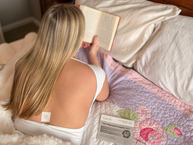Do you ever have trouble sleeping? You’re not alone, but chances are that there is a lot you can do to get better sleep. Here are 10 tips for better sleep each night.
Have a consistent bedtime.
When you have a consistent bedtime, your body starts to learn to get ready to go to sleep at those times. Going to bed at the same time each night can help you fall asleep faster instead of lying awake while your body’s awake. It’s also helpful to have a consistent waking up time. This includes both weekdays and weekends for best results.
Check your sleeping environment.
You can sleep best in a room that is cool and quiet. It should also be dark, and your bed and pillows should be comfortable.
Keep your room a device-free zone.
Clear phones and computers from where you sleep, or turn them off. Notifications can keep you from sleeping well.
Go outside during the day.
Getting natural sunlight during the day can help your mind and body be ready to calm down and sleep at night. A lunchtime walk or taking a work call outdoors can help you be outside.
Be physically active.
Exercise is energizing for your mind and body, but it also helps you feel tired at night. Most experts suggest getting at least 150 minutes per week of moderate-intensity activity, and more is better.
Watch alcohol intake.
Alcohol makes you feel tired, but it paradoxically interferes with sleep. Having alcohol at dinner can interfere with sleep cycles and make your sleep less beneficial. It’s best to limit alcohol intake, if you drink at all.
Avoid caffeine before bed.
Caffeine wakes you up, and it stays in your body for about 6 hours. It’s best to avoid caffeine after early afternoon. If you like coffee after dinner, decaf is a good choice that can taste the same without keeping you up all night.
Eat a smaller, earlier dinner.
A large dinner too close to bedtime can give you an upset stomach or just keep you awake. Instead, a light dinner that you finish at least 3 hours before bedtime can lower the risk of this.
Follow a bedtime routine.
A bedtime routine can be relaxing and prepare your mind and body for sleep. You might read a book, brush your teeth, take a bath, meditate, or make a to-do list for the next day. Something enjoyable and consistent is best.
Support your body with a vitamin patch.
The Sleep Aid Topical Vitamin Patch by PatchAid has ingredients, such as melatonin, that can help your body fall asleep naturally.* Melatonin is a hormone that your body produces to regulate sleep-wake cycles. The patch also has 5-HTP and L-tryptophan, which can be relaxing, as well as valerian root.
*The Food and Drug Administration has not evaluated these statements. PatchAid patches are not intended to diagnose, treat, cure or prevent any disease. Anyone with a medical condition should seek the advice of a licensed medical practitioner. Individual results may vary.







